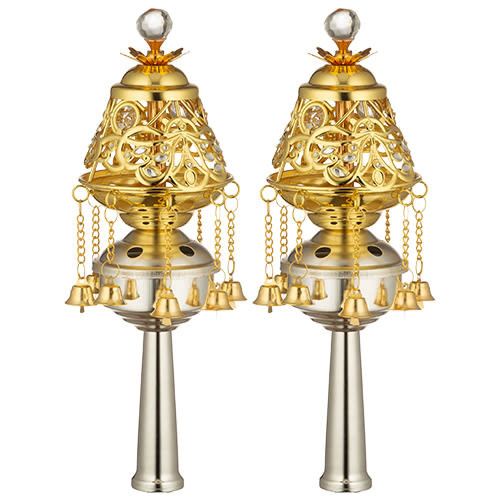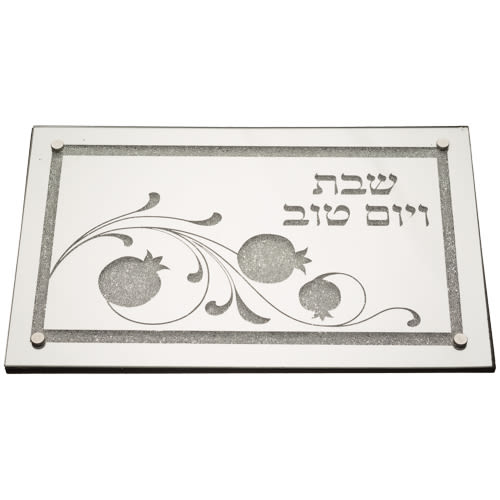
A Shining Goblet
A person might be a brilliant intellectual, but without emuna, he won’t be able to understand or internalize the gift of Torah that Hashem bestows on us...

Translated by Rabbi Lazer Brody
Rebbe Natan of Breslev teaches (Likutei Halachot, Laws of Negotiations, 4) that belief in Divine Supervision is the foundation of the entire Torah. Divine Supervision is the result of Hashem’s ability to see and direct every occurrence in the universe. Without belief in Divine Supervision, a person cannot believe in reward and punishment, since there cannot be a framework of reward and punishment if Hashem doesn’t see and know everything.
Some people have a general belief in G-d, but they don’t think He is involved in the day-to-day occurrences of our lives. It is difficult for them to fathom that Hashem controls the function of every single cell in our bodies.  King David therefore testifies, “Who is like Hashem, our G-d, enthroned on lofty heights? Yet He lowers Himself to see [everything that happens] in the heavens and on earth.” (Psalms, 113:5-6)
King David therefore testifies, “Who is like Hashem, our G-d, enthroned on lofty heights? Yet He lowers Himself to see [everything that happens] in the heavens and on earth.” (Psalms, 113:5-6)
Rebbe Natan concludes that the slightest doubt in Hashem’s precise Divine Supervision constitutes a total denial of Hashem, G-d forbid.
The barometer of true emuna, and particularly emuna in Hashem’s Divine Supervision, is an even emotional keel, void of anger and anxiety, leading a person to a worry-free existence. How can this be achieved? Someone who believes in Hashem’s Divine Supervision doesn’t look for scapegoats when something doesn’t go according to his plan or desires. He doesn’t persecute himself, nor does he torment his wife or children. He plays no blame games with people. He believes that everything in his life is the product of Hashem’s Divine Supervision – and it’s all for the very best.
A person can learn Torah day and night, but he won’t internalize his Torah learning without firm belief in Hashem’s Divine Providence, His detailed supervision over every creation in the universe. Many people have learned Torah throughout the generations, but the select few who succeeded in internalizing the Torah to the extent that the Torah permeated every fiber of their thoughts, speech, and deeds, were the ones who developed steadfast emuna in Hashem’s Divine Providence.
Genuine emuna in Hashem’s Divine Providence means that we see Hashem’s hand in everything that happens to us and around us, no matter how big or small. For example, if a person has a chronically itchy scalp and he attributes this to anything other than Hashem, he has not yet internalized his Torah learning. Sure, this young man might be one of the brightest students in his Yeshiva, but he doesn’t yet live and breathe his Torah.
People ask: If everything Hashem does is good, then why the punishments? The answer is simple: Hashem, like a loving parent, sometimes reprimands us in order to direct us to our optimal path in life – the path that both leads to our soul correction and enables us to perform our designated individual missions on earth. So, when things don’t go our way or we experience difficulties and the like, Hashem is merely stimulating us to assess ourselves. As such, life’s tribulations are not punishments, but a mechanism of Divine direction to arouse us from spiritual slumber and lead us on the right path.
We can now understand the seemingly harsh view of Rebbe Natan when he said that the slightest doubt in Hashem’s precise Divine Supervision constitutes a total denial of Hashem, G-d forbid. A person who considers tribulations and suffering to be random and illogical is spiritually blind. Like the wicked Esau, he fails to see the Divine wisdom within each occurrence and creation (Likutei Moharan, I:1).
The minutest stimuli in our lives are designed to bring us closer to Hashem. Those who ignore Hashem’s messages – the tiny and/or subtle wakeup calls from Above that are designed to bring us closer to Hashem and keep us from straying off the right path – are inviting upon themselves louder and more severe wake-up calls in the form of troubles and tribulations. The Gemara teaches us that when we reach into our pockets to pull out a dime and instead we pull out a penny, forcing us to reach into our pockets a second time to pull out the dime, the experience is a tribulation. When we ask ourselves why Hashem is troubling us by the need to put our hands into our pockets twice for what we could have achieved once, and we assess ourselves and do teshuva accordingly, we save ourselves untold difficulties.
If a person wakes up in the morning when you merely whisper his name, then you don’t have to pour a bucket of water on his head to get him out of bed. In identical manner, when we heed Hashem’s “whispers” – his subtle wakeup calls – we spare ourselves the louder and more megaphone-type tribulation wakeup calls.
Someone came to me with inexplicable knee pain after having been fully examined by an orthopedic specialist who found nothing wrong. The word for knee in Hebrew is berech. I asked the person if he’d been careful with the way he makes his blessings before and after eating. The Hebrew word for blessing is bracha, from the same root word as berech. This seemed to me to what Hashem was hinting here by way of the knee pain. Sure enough, the young man admitted that he was slipshod in that area. I suggested that he make a concerted effort to make the proper blessings at the right time and with intent. He did and the pain soon left him.
One doesn’t have to be a big tzaddik or kabbalist in order to interpret Hashem’s subtle messages. The more a person enhances his or her spiritual awareness – emuna in Hashem’s total Divine Providence and individual supervision over every single creation in the universe from greatest to tiniest – the more he or she will be sensitive to Hashem’s messages. We can all improve our spiritual receptors by strengthening our emuna in Divine Providence.
Each part of our body corresponds to a certain commandment of the Torah. An ailment of the body is likely to be a message that we must rectify a violation of a certain commandment. Anytime a person doesn’t feel well, he should put serious effort into personal prayer and self-assessment, asking Hashem to help him understand what he must correct. Asking a tzaddik or a reputable spiritual guide is also beneficial.
Everything that happens to us – both good and seemingly bad, both reward and seemingly punishment – comes from a loving Father in Heaven who wants us to maintain healthy and unblemished souls that are worthy vessels for Divine light. Like fine wine, Divine light would be wasted in a dirty receptacle. A sparkling crystal goblet is worthy of a thirty-year old Bordeaux; a shining and unblemished soul is worthy of Divine light.
Only when we put aside the nonsense so many people squander their lives with and make every effort to absorbing Torah in every fiber of our being, do we become the sparkling crystal goblet that shines with Divine illumination.










Tell us what you think!
Thank you for your comment!
It will be published after approval by the Editor.